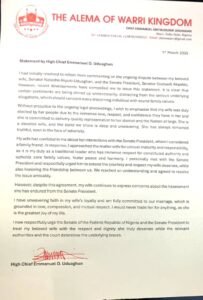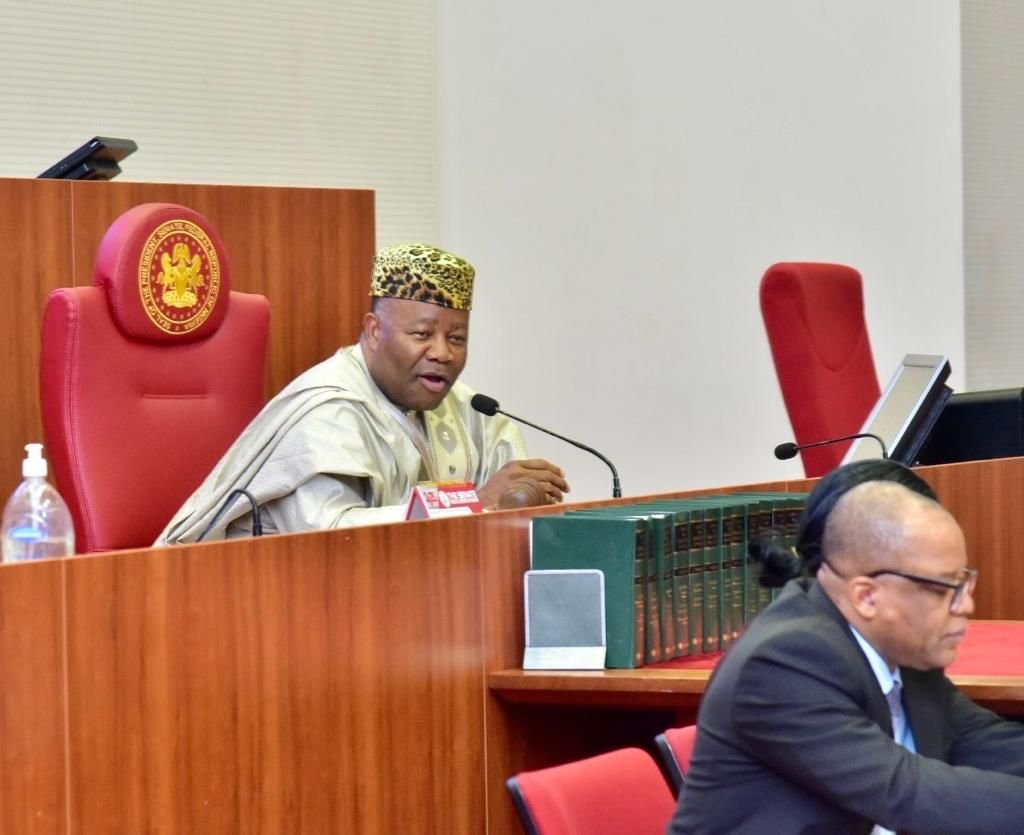Korede Abdullah in Lagos
The allegations of sexual harassment against the Senate President have sparked a heated debate, with lawyers weighing in on the burden of proof. According to the lawyers, the burden of proof lies with the accuser, as sexual harassment is a criminal matter.
Legal experts have underscored the fundamental principle of presumption of innocence, emphasizing that the burden of proof lies with the accuser.
Prominent Ado-Ekiti-based attorney, Chief Omotayo Oloruntola who spoke with Africa Health Report (AHR) on Sunday, stated that a person making the allegations has the responsibility to provide sufficient evidence to prove their claims.
The lawyer emphasized that in a criminal matter like sexual harassment, the accuser must demonstrate that the alleged harassment occurred and had a significant impact.
“In criminal matters such as these, the accused is presumed innocent until proven guilty. It is incumbent upon the accuser to provide compelling evidence to substantiate their claims”, Oloruntola asserts.
According to him, the principle is enshrined in legal systems worldwide, asserting that an individual is considered innocent until proven guilty.
Another legal practitioner, Abiodun Ajibade, echoed the same sentiment, saying that the accuser must show that the alleged harassment was unwelcome, severe, and pervasive, and that it created a hostile work environment.
“The burden of proof rests on the person who asserts, not on the one who denies. This ensures that no individual is unjustly condemned without proper evidence.
“The burden of proof is on the person making the allegations”, said the lawyer.
“In a criminal matter like this, the accuser must provide sufficient evidence to prove their claims beyond a reasonable doubt” he added.
Sexual Harassment
According to Oloruntola, sexual harassment is unwelcome sexual advances, comments of a sexual nature, requests for sexual favours, and harassment or comments about an individual’s gender, which create a hostile work environment.

“The National Industrial Court (NIC) has affirmed this position in the case of Ejike Maduka v. Microsoft, stating that sexual harassment in the workplace could be towards either male or female and abuse of the right to dignity of the human person”, he stated.
Proving Liability
To establish liability in a sexual harassment case, the accuser must show that the alleged harassment was committed by someone in a position of authority, and that the employer knew or should have known about the harassment and failed to take action.
The lawyers emphasized that the accuser must provide concrete evidence, such as documents, witness statements, and records of incidents, to support their claims.
The lawyers concur that the burden of proof lies with the accuser in allegations of sexual harassment. The accuser must provide sufficient evidence to prove their claims beyond a reasonable doubt, demonstrating that the alleged harassment was unwelcome, severe, and pervasive, and created a hostile work environment.
Spouses Interference
In recent developments within Nigeria’s political sphere, Mrs. Ekaette Akpabio, wife of Senate President Godswill Akpabio, has initiated defamation lawsuits against Senator Natasha Akpoti-Uduaghan, seeking ₦350 billion in damages.
This legal action stems from allegations made by Senator Akpoti-Uduaghan, who accused the Senate President of sexual harassment during a televised interview. Mrs. Akpabio contends that these accusations have caused significant emotional distress to her family and seeks both financial compensation and a public retraction from the senator.
In response, Senator Akpoti-Uduaghan has advised Mrs. Akpabio to refrain from involving herself in the matter, emphasizing that the allegations are directed solely at the Senate President.
Furthermore, High Chief Emmanuel Uduaghan, husband of Senator Akpoti-Uduaghan, has publicly cautioned Senate President Akpabio to respect his wife. These interventions by the spouses raise questions about the appropriate boundaries of involvement in official legislative affairs.
While personal support is understandable, the formal proceedings and resolutions of such disputes are governed by institutional protocols within the National Assembly.
Legal experts have weighed in on the appropriateness of external interventions in legislative matters.
Alhaji Kolade Adeosun, a development communication specialist and lawyer, in a brief chat with our correspondent, emphasized the importance of adhering to parliamentary decorum and constitutional law.
He noted that while freedom of expression is protected, it must operate within the framework of respect, order, and the rule of law.
Adeosun stated that the Senate President’s role includes maintaining order and safeguarding the integrity of the institution, suggesting that actions undermining these principles warrant corrective measures.
“My perspectives highlight the necessity of maintaining clear boundaries and adhering to established protocols within legislative processes, ensuring that personal interventions do not disrupt institutional integrity.”, he explains.
As the controversy between Natasha Akpoti-Uduaghan and Akpabio continues to unfold, the nation watches with bated breath, eager to see how the drama will climax.
Will new evidence emerge to tilt the scales of public opinion? Will the courts or investigative bodies step in with decisive action? Or will this be yet another high-profile political battle that fizzles out, leaving Nigerians with more questions than answers?
As tensions rise and fresh twists emerge, one thing is certain—this saga is far from over, and its outcome could have lasting implications for the country’s political landscape.



